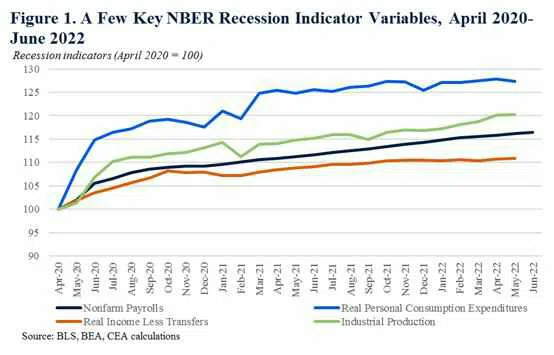The U.S. government redefined the conventional meaning of a recession, ostensibly in order to avoid its economy from slipping into recession earlier than it wants it to. Or at all.
That means even if GDP figures due out later this week show a second consecutive quarter of negative growth, the Biden administration will likely not refer to that as a recession.
In a blog post, the Council of Economic Advisers, an agency within the U.S. president’s office, said an economic recession could no longer be defined by two successive quarters of falling real growth, as is widely accepted.
“Instead, both official determinations of recessions and economists’ assessment of economic activity are based on a holistic look at the data – including the labor market, consumer and business spending, industrial production, and incomes,” it said preemptively.
“Based on these data, it is unlikely that the decline in GDP in the first quarter of this year – even if followed by another GDP decline in the second quarter – indicates a recession.”
Crypto markets cool off ahead of a busy week
U.S. economic output shrank at an annual rate of 1.6% during the first three months of this year. That figure is expected to show a gain of just 0.4% in the second quarter, when new data is released on Thursday, according to economists polled by Reuters.
Crypto markets fell sharply on Monday, with bitcoin and ethereum falling by up to 3.7% and 7.5%, cooling off after a massive rally from last week.
The decline comes ahead of what is lining up to be a busy week for global financial markets, with the Federal Open Market Committee meeting on July 27. Several major corporate earnings and the second quarter GDP report will also be released this week.
The Federal Reserve is widely expected to raise interest rates by 75 basis points in a bid to combat U.S. inflation, which hit a 40-year high of 9.1% in June. All these factors could potentially lead to volatility in global and crypto markets.
Janet Yellen: U.S. economy not in recession
Janet Yellen, the U.S. Treasury secretary, said economic growth is slowing but a strong labor market and consumer spending showed the U.S. economy is not currently in recession. She did not rule out the risk of recession in the future, however.
“This is not an economy that is in recession,” said Yellen on NBC’s ‘Meet the Press.’ “But we’re in a period of transition in which growth is slowing and that’s necessary and appropriate.”
Echoing the Council of Economic Adviser’s (CEA) comments, she added:
“Recession is broad-based weakness in the economy. We’re not seeing that now.”
The U.S. economy created 1.1 million new jobs in the second quarter. This equates to an average of around 375,000 jobs per month, per official data. This is three times more jobs created than in any three-month period leading up to a recession.
The unemployment rate held steady at 3.6% over the past four months.
Recession definition ‘a lie’
The National Bureau of Economic Research, which officially declares recessions in the U.S., says that a recession is “a significant decline in economic activity that is spread across the economy and that lasts more than a few months.”
Typically, it tracks several variables including personal income, jobs, consumer spending, and industrial production.
Perhaps a more poignant explanation of the whole debate derives from a post by one Twitter user replying to Jacqui Heinrich, the American journalist who brought the CEA’s definition to light.
“Recession has a simple definition: Two consecutive quarters of negative growth. It’s incredibly Orwellian, but incredibly consistent, of this administration to now redefine what we all know the word means. Let’s call this what it is: a lie,” said the user.
Another shouted: “In other words, it’s only a recession if it is declared a recession by the very people who have the most vested interest in not having a recession declared.”
Disclaimer
All the information contained on our website is published in good faith and for general information purposes only. Any action the reader takes upon the information found on our website is strictly at their own risk.


